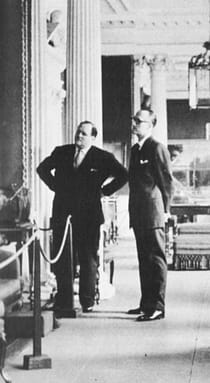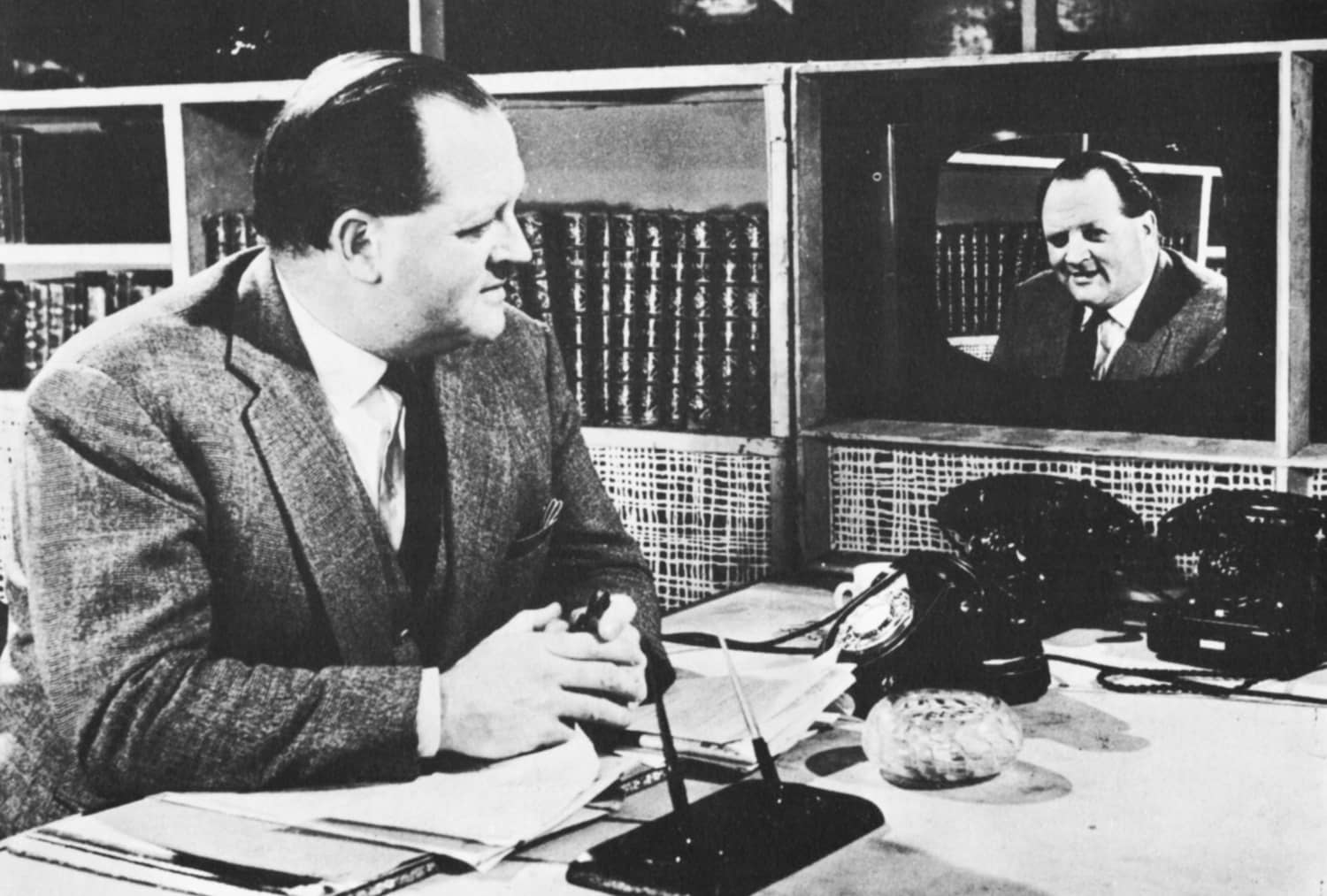By 30 September 1957 Richard Dimbleby had completed twenty-one years of broadcasting. In Panorama that evening he took stock of his career in a self-interview by asking questions of his image fed from another camera on to a television screen:
Question: Mr Dimbleby, you began broadcasting twenty-one years ago. How many broadcasts – radio or television, all put together – do you think you’ve done in that time?
Answer: Well, I’ve tried to add it up – I think it must be in the region of – it’s approaching three thousand.
Question: Well, out of those three thousand are there any particular ones that you remember more than any other?
Answer: Yes, I think there are – I think there are five. The first one was 1938 – these are all occasions on which I was commentator or present – 1938 when Chamberlain came back to Heston Airport, the height of the Munich crisis, waving in his hand a little bit of paper and saying ‘This means peace in our time’, if you remember; and then the first report from the Western Front in the Second World War, that the BEF had gone into action against the German Army, I happened to give that one myself. And later on in the war the discovery of the Belsen concentration camp, I was among the first three people who went in through the gates of that camp, something so horrible I’ll never forget it. Much later on the Coronation of our Queen, because I think that was a great occasion, for television, apart from all its other implications. And more recently, a couple of years ago, the marathon general election television broadcast when we seemed to go on for about twenty-one hours on end without stopping.
Question: Now if I may ask you just one or two pointed questions about yourself and hope for a frank answer. It has been said by people that you’re only really happy in what you’re doing and only really successful in what you’re doing when you’re mixing with dukes and you’re messing about in stately homes. What have you got to say to that?
Answer: Well, it’s absolute nonsense to start with. I have had to do quite a lot of these ‘At Home’ programmes for the BBC, which does involve going into stately homes, and in stately homes you are apt to find dukes, you can’t help that. You find lots of other people too, commoners as well. If the Duke is lively and the stately home’s a beautiful one, I’m perfectly happy, but I’m no more at home there than I am anywhere else. In the course of my twenty-one years I’ve been all over the country, I’ve interviewed everybody under the sun, I’ve always felt welcome and I’ve always felt perfectly at home. Duke or dustman or anyone else, I don’t mind who it is.

Question: Well, would you answer this – the critics frequently say that you are pompous. What about that?
Answer: Now that’s something that makes me livid. Look, I don’t think that they know, half of ’em, the difference between pomp and weight. In all the years that I worked in radio and wasn’t seen, nobody ever said I was pompous. The moment I appear on a television screen, they say – He’s pompous. I know what it is, they see I’m enormous – I can’t help that, I am – and because I’m heavy and large they think that heavy and large people are pompous. If I may say so, it’s exactly the same thing as when they say that I’m talking in reverential hushed whispers – I daresay you’ve read that quite often. The reason very often being that on a State occasion or a big occasion, a lot of which I’ve had the good fortune to do for the BBC as a commentator, on those occasions if you’re in a large hushed hall during a solemn ceremony you can’t exactly shout in a Light Programme type of voice, or you’d drown the ceremony and bring it to a standstill. That’s the only reason why I ever whisper anywhere – it’s not reverence, it’s pure necessity.
Question: Well, what about the critics – have you any views on them?
Answer: That’s a temptation. Critics – in my opinion there are only four real television critics in Great Britain. The rest are newspaper reporters who’ve turned to television as a change from crime.
Question: Well, now I’ll ask you, if I may, the sixty-four thousand dollar question – the last one – and it’s this – I’m sorry, you can’t do that, time’s up.
Answer: Yes, well, you’re quite right, so it is.

